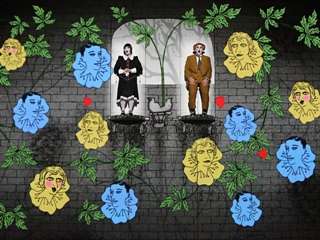|
Back
Gone Like Magic! New York
David H. Koch Theater
07/17/2019 - & July 18*, 19, 20, 2019
Wolfgang Amadeus Mozart: Die Zauberflöte, K. 620
Vera-Lotte Böcker*/Maureen McKay (Pamina), Aaron Blake*/Julien Behr (Tamino), Christina Poulitsi/Aleksandra Olczyk* (Queen of the Night), Dimitry Ivashchenko/Wenwei Zhang* (Sarastro), Rodion Pogossov/Evan Hughes* (Papageno), Talya Lieberman (Papagena), Johannes Dunz (Monostatos), Ashley Milanese, Karolina Gumos, Ezgi Kutlu (Ladies), Timothy Oliver, Samuli Taskinen (Armored Men)
Mostly Mozart Festival Orchestra, Louis Langrée (conductor)
Suzanne Andrade and Barrie Kosky (co-directors), Paul Barritt (animation), 1927 (Suzanne Andrade and Paul Barritt) and Barrie Kosky (concept), Esther Bialas (stage and costume design), Diego Leetz (lighting design)

(© Michal Daniel)
“Mozart...succeeded in combining the two elements which go to make up everyday life in a way which may occasionally have been approached since his day, but which had hardly before been attempted and has never been surpassed.”
Lord Harewood
Having seen at least a half of a dozen productions of The Magic Flute at various opera houses and three films of note, I still treasure a pared down version at the old Amato Opera House, whose limited staff produced the most magic per minute. Alas, they are long gone now, so this season we turn our attention to an import that is billed as the jewel in the crown of this season’s Mostly Mozart Festival. At the New York Sun, my “beat” included the Koch Theater and so I was anxious to hear another opera within its walls, although I was never very fond of the acoustics of the place.
Leaving aside the parallels to the Freemasonry of several of the first chief executives of the United States, the genius of Mozart shines through as this story, seemingly out of an era long gone, still excites deep emotions and convoluted conversations. Zauberflöte is rich in detail and steeped in Mozartean lore, as the composer would die just two months after its premiere.
This production from the Komische Oper (Berlin) is certainly unusual but never really captures the unique quality of the Schikaneder/Mozart collaboration. There is much experimentation, grafting the heads of the singers onto the bodies of the mythical creatures who gyre and gimble in the wabe. Singers are often pushed into the background in order to feature the bizarre goings-on of the story. The result is reminiscent of the look of a children’s television show of the 1980’s, recalling Pee-wee Herman and his surrealistic creativity. But it is all too much and what gets jettisoned is the opera itself.
There are two distinct casts and I was there to review the Thursday night ensemble. In the classic film Citizen Kane, Jedidiah Leland has to write the review of his publisher’s girlfriend and her debut at the opera. As the drama critic he is able to begin his article with the phrase “Her singing, happily, is of no concern to this department.” Not being so fortunate, I am forced to report on a rather disappointing collaboration of fantasy and musicianship.
The evening began with an overly heavy rendition of the overture, that signature Mozartean light touch subsumed in a sea of misguided or misplayed notes. Positively cringeworthy. It is comforting to think that this was simply a night of the wrong cast at the wrong time. However, a critic can only review what he hears and therein lies the rub.
Certainly there were fine singers in this ensemble. Wenwei Zhang was superb as Sarastro and Aaron Blake did what he could as a Tamino relegated to a corner of the stage more often than not. However, Aleksandra Olczyk was completely overmatched by “O zittre nicht” and left us feeling that the Queen of the Night was really of little consequence. She was certainly no Josefa Hofer.
The remainder of the cast seemed chosen more for their visual characteristics than their musical acumen. For example, Monostatos was made to look very much like Max Schreck, which was fitting as the entire production had the feel of silent German expressionism. A noble experiment? Perhaps, but I wasn’t laughing.
Fred Kirshnit
|